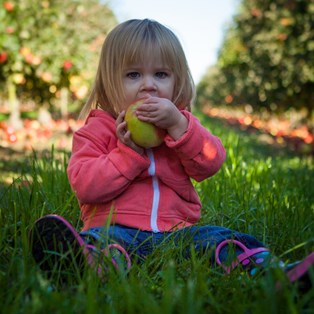Baby’s first food: what are the best first foods for a baby?

Your guide to feeding your bub
By Alex Harmon
February 01 2019
Is your baby eying off your dinner and licking his lips? It might be time to start solids! Starting your baby on solid foods can be an exciting milestone, albeit a nerve-wracking one (for parents) and messy one (for babies).
When you decide to bring baby’s first solids to the table, you’ll need to be armed with knowledge … and wipes. Here is some advice on how to start your bub on solids and the best first foods for your baby.
At what age should you give your baby food?
Your inquisitive bub will start to show signs he is ready for solids. However if you aren’t picking up on any cues, as a guide the best time to start introducing solids is around six months old. You can start earlier, at around five months, but not before four months, his little digestive system won’t be ready. Make sure he can sit upright in his chair and hold his head steadily. And remember, even if your bub loves his new food, you’ll still be breastfeeding or using formula until your baby is at least 12 months old.
How to start your baby on solids
Timing is everything. It’s recommended you begin introducing baby foods after a breastmilk or formula feed because when your bub is really hungry, he’ll just want what he knows best. Start slowly and try to be relaxed as he will be more willing to try if he sees you happy.
Texture is important. All foods will be exciting so offer a range of textures so that your baby learns to chew, even if he doesn’t have many (or any!) teeth, as this will help with his jaw muscles and speech development. First foods can be mashed, pureed or in whole soft pieces, so long as care is taken with foods like meat which contain small bones.
Start small. There’s no need to prepare a three course meal. Just begin with 1 or 2 teaspoons of food after a milk feed.

getty images
Best foods to start baby on:
1. Iron-fortified cereal
This can be mixed with breastmilk, formula or water. It’s been a tried and trusted first baby food for years.
2. Pureed vegetables
Get some goodness unto bub by cooking and pureeing or mashing vegetables such as potato, sweet potato, green beans, pumpkin or carrot.
3. Minced meat
This can be red meat, poultry or fish. For vegetarian babies, try cooked tofu and legumes for an iron-rich meal.
4. Soft fruits
Banana, soft pear and avocado make for an easy to prepare first food, just peel and serve on a spoon or cut into pieces and let him pick up.
5. Natural yoghurt – the best option is plain, unsweetened, pasteurised yoghurt (regular or Greek) made from full fat milk.
Finger foods
From around 8 months you can begin to offer finger foods. Fruit and vegies are the ultimate finger foods to let bub explore his new feeding techniques. You can also try things like boiled eggs, chunks of cheese, pasta (penne is an easy one to pick up), tofu or fish bites, small bits of sandwiches or homemade pikelets.
Important things to note:
To prevent botulism, do not feed honey to babies aged under 12 months. Experts say to include common allergy causing foods in your child’s diet by 12 months. These foods include egg, peanut, wheat, cow's milk, tree nuts, soy, sesame, fish and other seafood. Delaying or avoiding the introduction of these foods may increase the risk of your baby developing an allergy. If you believe your baby has had an allergic reaction to a food, avoid giving that food again and make an appointment to see your doctor.












